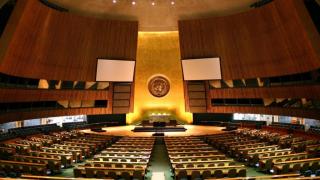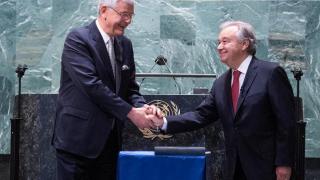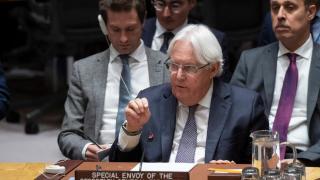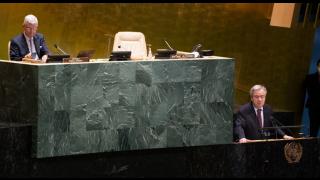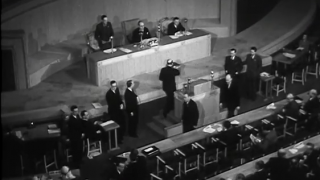
70 years ago today, Trygve Lie became the first UN Secretary-General. Following his recommendation by the Security Council, the General Assembly held a secret ballot, which saw Lie, a former Norwegian foreign minister, elected with 46 votes to 3 (see video below). His election followed the selection process originally envisioned for the role.
The UN Charter affords the appointment just one sentence in Article 97: “The Secretary-General shall be appointed by the General Assembly upon the recommendation of the Security Council.”
The involvement of both bodies reflects the realities of the Secretary-General's operating context. But informal practices have skewed this balance, relegating the General Assembly’s role and increasing further the influence of the Security Council’s five permanent members.
Initially, proposals were made for the Council to put forward candidates for the Assembly to vote on by secret ballot. However, in January 1946, the General Assembly defined a process aimed at promoting stability in the immediate post-war environment, adopting resolution 11(1), which stated that it “would be desirable” for just one candidate to be recommended to it by the Security Council and for debate on the appointment to be avoided in the Assembly.
Since then, the appointment process has become an extreme interpretation of this 70-year-old non-binding resolution. The Security Council makes its decision behind closed doors, subject to secret bargaining, including on other senior UN appointments. In the past, some member states did not know who was on the ticket until after the selection had effectively been made.
It has not always been so. In 1950, deadlock in the Security Council over Lie's re-appointment saw the General Assembly again play a decisive role. Despite objections from the Soviet Union - a permanent member of the Council - it voted by 46 votes to 5 (and 8 abstentions) to extend Lie's term of office. It also varied his term of office, from the five years envisaged in resolution 11(1) to three years.
70 years on, the selection process is gradually becoming more open and inclusive, thanks in part to the efforts of the 1 for 7 Billion campaign, which UNA-UK co-founded in 2013.
In September last year, the General Assembly passed an historic resolution, setting out much-needed reforms to the selection process, including clear selection criteria and dialogue between candidates and member states.
This resolution was followed by the release of a joint letter by the presidents of the General Assembly and Security Council, calling for the formal nomination of candidates "in timely manner" and committing to circulating candidates' names on an on-going basis. The letter marks – for the first time in the UN's history – the start of an official selection process for this crucial role.
1 for 7 Billion is now calling on states, parliaments and civil society to put forward high-calibre candidates for the post. We are also calling for the next UN leader, to be appointed in the second half of 2016, to stand for a single, non-renewable term, as this would strengthen the independence and accountability of the office.
Speaking about the anniversary, Natalie Samarasinghe, UNA-UK's Executive Director, commented:
This Friday, UNA-UK will host Ban Ki-moon, the current UN Secretary-General, in the same hall in which Trygve Lie was elected 70 years ago. It is striking how much this important role has changed since 1946. The Secretary-General now works with 193, not 51, member states; leads over 40,000 staff and oversees the work of some 30 funds, programmes and agencies which deal with a bewildering number of issues.
It is high time that the selection process changes too, and UNA-UK is delighted to be part of the global 1 for 7 Billion campaign to make it more open and inclusive. This is something Mr Ban himself said in an interview last year: “After 70 years there should be more transparency. I also think it is high time to have a woman of integrity and experience.”
Photo: Delegates voting to elect Trygve Lie, Central Hall Westminster, 1 February 1946.


